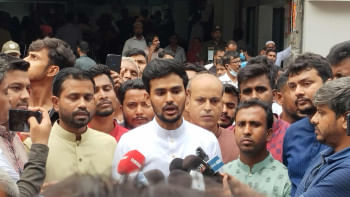Who is minding the ship?

In recent months the Bangladesh economy seems to be slowly drifting into turbulent seas like a rudderless ship, buffeted by the increasingly deep political impasse. Signs of strain are already emerging in terms of loss of GDP growth, increasing inflationary pressure, shortfall in revenue collections, stagnant investment, rising non-performing loans in the banking sector, turmoil in the trading sector and ongoing difficulties in the RMG sector. On top, the economy is facing an uncertain near-term prospect. This is a very unfortunate development and as citizens we must be very worried and would like to ask: who is minding the economic ship?
True, as a country Bangladesh has done well especially since the early 1990s. Good economic policies have paid off, as reflected in the higher GDP growth path and rising per capita incomes. Alongside, the social and human development indicators show that the country has done very well. The reduction in poverty witnessed since 1990/91 is particularly noteworthy. Yet, there are huge challenges that are a reminder that there is no room for complacency.
Despite progress, some 47 million people are below the poverty line. The consumption basket of these people is a very modest one: around Tk 1,600 per person per month in FY 2013 prices. There is another 28 million population who consume barely above the poverty line (Tk 2,000 per month). A small disturbance, such as an illness in the family or temporary loss of livelihood from political disturbances as presently, could easily push this vulnerable group to slide back in poverty.
The economic and social wellbeing of this group of poor and vulnerable population depends critically upon the level of economic activity, especially relating to agriculture, trade and informal services. By disrupting trading, transport and other service-related activities, the political turbulence has an immediate adverse effect on the income and consumption possibilities of the poor and the vulnerable. Unlike the rich and middle class, this group does not have much savings or assets to smooth their consumption and ride out the crisis. This is an immediate and urgent challenge for the government to worry about.
The short-to-medium-term challenges are equally daunting. With sliding economic activities, difficulties in the banking sector, especially the near-bankrupt public banks, stagnant investment owing to political uncertainties and shortfall in government revenues, there is a real risk that the rate of GDP growth will fall to 5 percent or below owing to a continuing political impasse. If this downward trend in economic activities is not arrested and reversed soon, the adverse consequences for poverty reduction could be severe.
Pushing the already troubled banking sector to pump subsidised loans to jack up the economy without resolving the political impasse will be self-defeating. It could fuel inflationary pressure and also further aggravate the fragile health of the banking sector. This may make some business beneficiaries temporarily happy but this policy cannot be sustained for long. Importantly, higher inflation will certainly hit hard the poor and vulnerable group by deflating the real value of their incomes.
Domestic political impasse is increasingly spilling over to the international arena. This is unavoidable in today's' globalised world. We have already witnessed how domestic political issues in the Middle East have gotten absorbed in the global political scenario. So, our political leaders cannot simply wish away or express disdain for global political interventions. Whether we like it or not, this is a reality and we must internalise this downside risk in deciding how we wish to manage our political governance.
The global links to Bangladesh development prospects are much deeper now than ever. As a nation we could perhaps venture to ignore the increasingly small and falling value of official foreign aid, though this is not at all desirable.
But what about the two-star performers of the Bangladeshi economy: RMG exports and remittances? Together they fetched some $36 billion in FY2013, which is about 24 percent of our entire GDP. Anything that hurts these resources would have serious consequences for the economy as well as our social stability.
Both are affected by global developments, including policy decisions in host countries. The RMG sector is particularly vulnerable owing to the reliance on GSP benefits in Europe. We have seen from the examples of many developing countries in Africa, Asia, Latin America and the Middle East how policy decisions on trade and immigration in host countries are influenced by the beneficiary country's political environment. This is especially true if the prevailing political governance is not considered as compatible with internationally acceptable norms. So, the choice of political governance at home cannot be completely isolated from this reality.
Bangladesh is a proud and energetic nation. It has confounded the prophets of doom and shown that development is possible even when faced with daunting resource constraints and natural disasters. The guiding spirit in all of this effort has been a dynamic people who are basically very hardworking, honest, easy to be content and cherish all types of freedom. There is an ongoing demographic transition that holds the promise of further progress with development. The challenge for political governance is to match this positive spirit instead of countering it and become a binding constraint. The earlier we resolve the political impasse, the lower the cost to the economy.
The writer is vice chairman of Policy Research Institute of Bangladesh. He can be reached at [email protected].

 For all latest news, follow The Daily Star's Google News channel.
For all latest news, follow The Daily Star's Google News channel. 



Comments